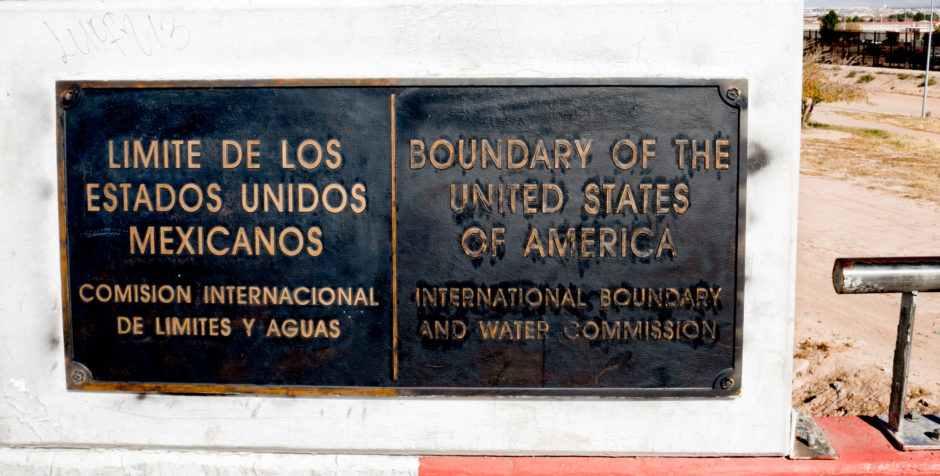Two Things You Need to Know About the Shutdown and Border Security
As the government shutdown enters its second month, congressional Democrat leadership still remain intransigent on reaching a compromise that would open the government and also provide funding for some type of barrier on the U.S. border with Mexico. Meanwhile, thousands of people in at least two different caravans are making their way from Central America to the U.S. border. Some 800,000 federal workers are about to miss their second paycheck in a month.
As I mentioned in a post on the ACLJ website a month ago, the issue of border security is a moral issue. Human traffickers who ply their trade across our southern border where young women are forced into the sex industry, and men and women are put into forced labor situations, make this a moral issue. The drug cartels who take advantage of our porous border, while thousands of U.S. citizens die annually from overdoses and drug-related gun violence, are also indicative of the moral implications of this matter. MS-13 gangs crossing the border and living in the shadows in our country where they terrorize communities, including especially immigrant communities, clearly point to the moral ramifications of border security. The case can be made that national security also makes border security a compelling moral issue.
The issue of border security and immigration in general is not new. It has been debated for decades. Occasionally Congress has actually done its job and passed meaningful legislation pertaining to both immigration reform and border security. Here are two things you need to know about the ongoing stalemate.
- President Trump has repeatedly called for negotiations, only to be summarily rebuffed by the Left. His latest compromise offered the following:
- Provisional status would be granted for three years to current DACA recipients, covering some 700,000 immigrants brought here as children by their parents. This status would give them access to work permits, social security numbers and protection from deportation.
- Provisional status would also be granted to current Temporary Protected Status (TPS) recipients for three years, providing it for 300,000 immigrants whose protected status is expiring, giving them more certainty as Congress works on a larger immigration deal.
In exchange for the above, the Trump Administration would secure 5.7 billion dollars for a steel barrier system; 805 million dollars for technology, canines, and personnel to help stop the flow of drugs, weapons and so forth; 800 million dollars in humanitarian support for those gathered on the border wanting entry; 782 million dollars to hire more border agents, law enforcement officers, and staff; and 563 million dollars to support our immigration program, including 75 more immigration judges to reduce the 800,000 cases backlogged in our immigration courts.
Even before the President’s compromise was offered, Democrats were saying “NO” to this deal, “no” to whatever he was offering.
- Many of the same Democrats who are opposing President Trump on border security actually voted for barriers on the southern border—repeatedly.
- In the 1990s, 14 miles of border wall was placed along the border in San Diego, California. It resulted in illegal crossings decreasing 95 percent. It was overwhelmingly supported by Democrat Members of Congress. Bill Clinton was President. Contrary to what many are saying, walls and barriers are effective.
- The Secure Fence Act of 2006 passed the Senate and the House, providing for 700 miles of barriers, drones, ground-based sensors and radar coverage. Senator Schumer voted “Yes,” along with 79 other Senators, including Hillary Clinton, Barack Obama, and Joe Biden. In the House, 64 Democrats joined Republicans in passing this border security bill. The Government Accountability Office (GAO) states that this act of Congress was completed in 2015 at an estimated cost of 50 billion dollars.
- The Comprehensive Immigration Reform Act of 2007 passed the Senate with Senator Chuck Schumer voting yes. The bill died in the House of Representatives.
- In 2013 the Border Security, Economic Opportunity and Immigration Modernization Act was actually introduced in the U.S. Senate by Senator Chuck Schumer. It passed 68 to 32 but was never acted on in the House. The projected cost by GAO on this bill was 197 billion dollars over 10 years. This makes the Democrats’ objections to President Trumps request for 25 billion, and now only 5.7 billion this year, seem trivial and blatantly political; it is. This legislation sponsored by Mr. Schumer is amazingly similar to things the President has considered, including making immigration “talent-based” and putting restrictions on the H1B visa program. It would have eliminated the Diversity Visa Lottery, replacing it with a lottery for immigrants already in the U.S. legally.
- The Internet is full of speeches by Democrat leaders who, prior to Donald Trump becoming President, were eloquent and insistent in calling for immigration reform and strong barriers on our southern border.
Democrats do not like President Trump, generally. But their loathing of our President has become an obstacle to their responsibilities to the American people. Their personal opinions are clouding their professional judgement and damaging their credibility. Their objections to President Trump’s requests ring hollow and untrue in light of their voting records and positions they took previously regarding border security and immigration. Hundreds of thousands of Americans are going without a paycheck so the Left can make a political point. This is shameful. The American people deserve better.
Negotiation and compromise is the only way to bridge this impasse. It is what legislators are supposed to do. It is time for Democrats to negotiate and compromise with the President, something he is willing to do. To do otherwise is indefensible and unfair to the people of the United States, as well as to the people who congregate along our borders seeking a better life.
